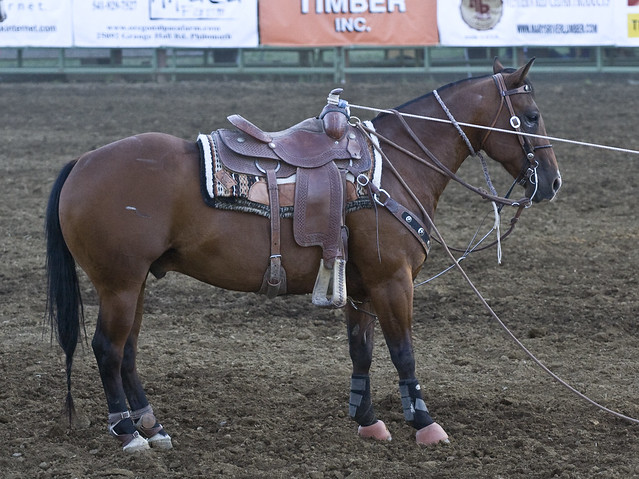"Slaughter has become the garbage can for the performance horse industry."--Patricia Hogan, VMD, ACVS
I'm not sure if I've made my position clear, but I'm not against the killing of horses, per se. Not against people who eat horse meat. Not against rendering plants that turn horses into dog food, glue, and leather. Nor zoos and big cat sanctuaries who accept horses to feed their animals. Nor am I against taking old Bessy to the back pasture and putting her down with a bullet in the cowlick. Or even, if that's your thing, raising a nice fat Percheron and then calling in the mobile slaughter truck to turn it into steaks for your own freezer.
No. These things are not necessarily bad. Horse slaughter, however, as practiced right now, is inhumane and unnecessary.
The apologists say it's the only means that some people have of disposing of horses they can't care for or horses that are old/lame. They cry: better a horse suffer a short time at the slaughter plant than a long starvation, right?
Bullshit.
Horse slaughter is not about disposing of unwanted horses. That's just a side effect, and really a small one at that. Most of the horses in the above situation - old, sick, lame - either cannot legally go to slaughter, or the kill buyer won't buy them anyway. They make more money per shipment if the horses are fat and healthy.
Horse slaughter is about making money.
Like puppy mills, it's a symbiotic relationship between three parties: the souless (or occasionally clueless) breeders, the breed registries who apparently only exist to make money on new baby registrations, and the middle man, which in the case of horses is the meat buyer, and in the case of puppy mills, is the pet store.
The main difference is that in the case of the puppy mills, the "culls" being sold from the middle man (the pet store) end up in a home instead of in a Frenchman's stomach.
But the effect is the same: the middle man gets money, which in turns encourages the breeders to continue over-producing a product because, hey, if it don't sell at a premium price, there's still some money to be made.
In both cases the majority of the public just want a pet. Either a horse they can show or jump or ride the trails. Or a dog the kids can play with. Breeding only matters insomuch as it provides them with an animal that fits their needs.
In both cases there is simple fix: take money out of the equation.
Make horse slaughter illegal and breeders can't make easy money off of their unwanted three year olds that they didn't bother to train. Hopefully it forces them to slow down production and focus more on quality instead of quantity.
Make it illegal to sell puppies in stores, and you strike a blow to puppy mills. True, disreputable breeders will always find 'loopholes'. I can, for example, easily picture a puppy mill disguising itself as a 'rescue' and continuing business as usual, except calling the sales "adoptions". However, right now puppies and kittens sold in stores are overwhelmingly from puppy mills, and there's no need for it.
Indeed, the ease of online advertising also means it's easier for ethical breeders to compete with puppy mills for advertising eyeball time, whereas ethical breeders wouldn't dream of trying to compete by selling their pups in a store to the first person to slap down the cash.


No comments:
Post a Comment